One Day in Bruges Belgium | Step-by-Step Bruges Itinerary with Trip Notes

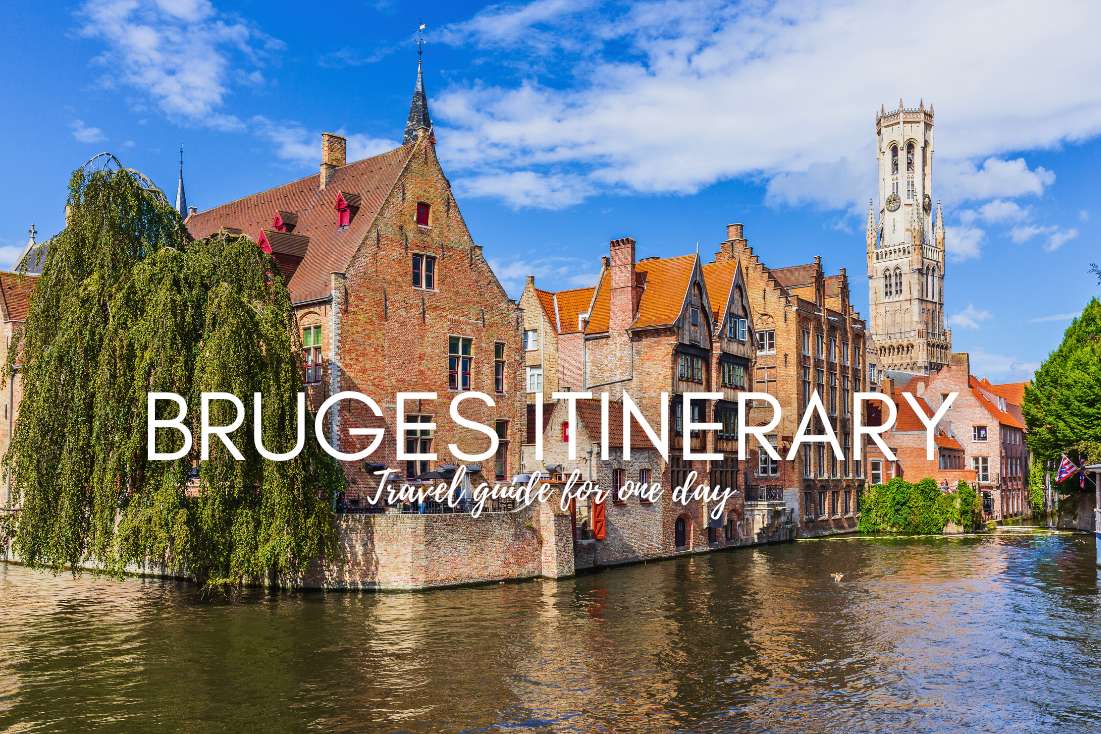
Quick summary: Your 1-day Bruges itinerary at a glance
My trip notes for this Bruges itinerary: Where to eat, sleep, and travel tips
Bruges itinerary, stop 1: Arriving at Bruges train station
Bruges itinerary, stop 3: Check out Sashuis and the white facades of Beguinage Ten Wijngaerde
Bruges itinerary, stop 4: A quick visit to the Church of Our Lady Bruges
Time for a Belgian Waffle! My tip on where to get the best one
Bruges itinerary, stop 5: Choose one of these three museums in Bruges
Quick stop 6: Bonifacius Bridge aka the Love at First Sight Bridge
Lunch in Bruges at a family-run restaurant
Bruges itinerary, stop 7: Hop on a cute boat for a Bruges canal tour
Bruges itinerary, stop 8: Climb up the Bruges Belfry tower and visit the Market Square
Bruges itinerary, stop 9: Tour the incredible Bruges Town Hall on De Burg Square
Bruges itinerary, stop 10: See Jesus’ blood at the Basilica of the Holy Blood
Bruges itinerary, stop 11: You have to try the Bruges Beer Experience (or alternative brewery tour)
Alternative: Brewery tour at De Halve Maan Brewery
Bruges itinerary, optional stop 12: Admire Bruges’ windmills… and then off to dinner
Dinner in Bruges: Where I ate the best steak in Belgium
How to get to Bruges (and where to park your car in Bruges)
Which is better, Ghent or Bruges?
A day in Bruges means romantic canals and bridges, medieval houses, great museums, and the best beer experience in the world… It seems everyone adores Bruges, but I’ll be honest, I wasn’t completely in love with it.
Don’t get me wrong, it’s a fantastic destination for a day trip from Brussels, but the crowds of day trippers got on my nerves just a tad.
That’s just 2.5 million visitors who stay the night as opposed to around 6 million others who are just visit Bruges for a day.
To me, Bruges (pronounced [broozh]) felt more like a tourist movie set than an authentic city, but I gave it a test punch and those brick walls are the real deal. So, while it’s not my favorite place in Belgium, I want to do it justice.
Below, I’ll show you how to spend the perfect day in Bruges: what to see to make the most of your time, where to eat, and which attractions I thought were worth it. I’ve planned the route so that you can easily take it straight from the Bruges train station.
Read more from my Belgium travel blog.
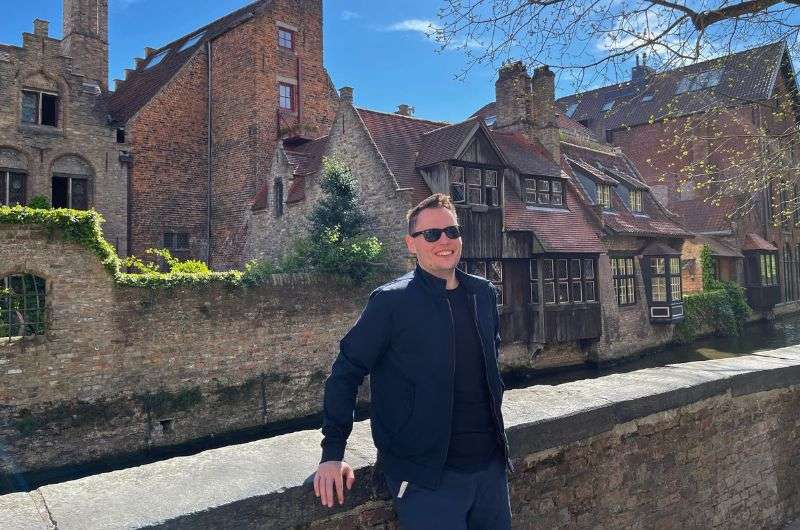
Wandering around Bruges is a wonderful experience by itself!
Quick summary: Your 1-day Bruges itinerary at a glance
Here's the plan for your one day in Bruges, Belgium, in order of how you’ll be visiting them:
-
Stop 1: Start at Lovers' Bridge and Minnewaterpark – ease into the day with a peaceful walk through Bruges' greenest corner, right by the train station.
-
Stop 2: Pass by the Sashuis and explore the Beguinage – a quiet, cloistered world stuck in the 13th century.
-
Stop 3: Visit the Church of Our Lady – admire Michelangelo’s Madonna and a heap of tombs.
-
Stop 4: Pick one museum – Gruuthuse for the aristocratic weirdness, Sint-Janshospitaal for medieval medical gear and religious art, or Groeninge for Flemish art. All in interesting buildings.
-
Stop 5: Take a canal tour – yes, it’s touristy, but it’s a must-do activity in Bruges, and the guides are entertaining.
-
Stop 6: Climb the Belfry and explore Market Square – climb the spiral staircase to the top for a view, then wander the large square.
-
Stop 7: Walk through De Burg Square – step inside Bruges Town Hall and the Basilica of the Holy Blood (they claim to have Jesus' blood).
-
Stop 8: Tour a brewery – either the Bruges Beer Experience (absolutely epic museum) or Halve Maan (real beer tanks).
-
Stop 9: Finish at the windmills – decompress with a quiet stroll past the last of Bruges' old wooden mills.

Bruges city center map
This is the route you’ll follow during your Bruges day trip
Bruges is compact and you’ll have no trouble walking everywhere you need to go, even the train station, which is very close to the city center towards the south.
If you're still not sure whether Bruges is the right city for you to visit, I've written a whole article on whether I think Bruges is worth visiting or not.
Sometimes, all you need to do is take the first step... I've filtered out the best hotels in Bruges for you
Save it for yourself to come back to later, or share with your friends on social media!
My trip notes for this Bruges itinerary: Where to eat, sleep, and travel tips
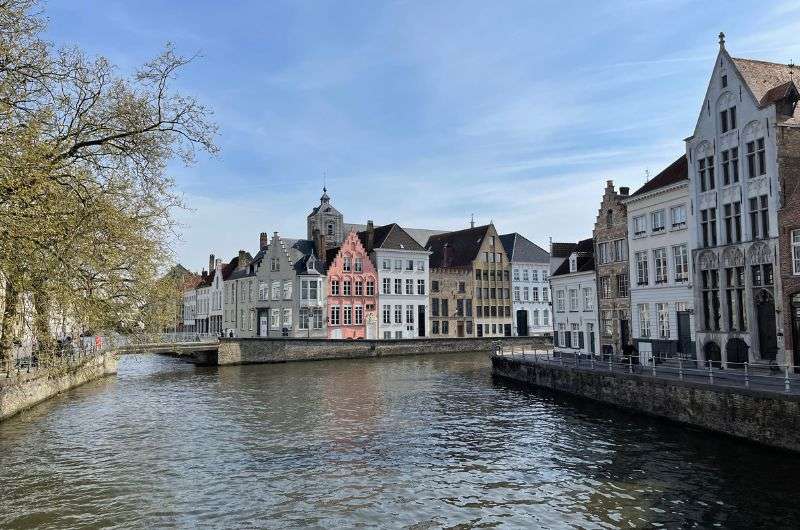
Ready for Bruges?
-
Restaurant tips: Bistro Christophe | De Gastro | Otto Waffle Atelier
-
Hotel recommendations: Boutiquehotel 't Fraeyhuis (my personal choice) | Dukes' Academie Brugge (love the courtyard vibe) | Relais Bourgondisch Cruyce (right on the canal but not my style)
-
Further reading: Best Places to Visit in Bruges | Ghent 1-Day Itinerary | Best restaurants in Belgium

Travel tips I gathered while visiting Bruges:
-
Buy the Musea Brugge Card for EUR 33 if you want to visit the Belfy, the Church of Our Lady, and at least one other museum or gallery in Bruges. It gets you into every museum for free, and usually gets you a free time slot reservation, too. Individual entrance fees are EUR 15 at most places.
-
Make sure to get your Belfry ticket in advance! There is a maximum capacity of 16 people inside at a time and it does sell out almost daily.
-
English is widespread. It makes exploring the city really easy, and you don’t have to worry about not being able to communicate.
- Don’t expect nightlife. Evenings in Bruges are a very relaxed affair, since all the day trippers are gone by 5 pm. It’s dinner and drinks, and an early bedtime in Bruges.
Bruges itinerary, stop 1: Arriving at Bruges train station

So, hop on a train! Bruges is waiting!
I’ve planned this Bruges itinerary so that it starts with the places closest to the train station and works its way up from there so you can start your Bruges day trip the moment you get off your train. I’m effective like that.
Contrary to my usual recommendation to rent a car everywhere you go, I say stick to train travel in Belgium. Trains are cheap, fast, and frequent, making it completely unnecessary to get a car. (I have added a section about parking in Bruges at the end of this article.)
Getting from Brussels to Bruges
- Travel time from Brussels Central Station to Brugge Station is 1 hour
- Standard ticket fare is EUR 17 (higher if you book last minute)
- There’s a direct train from Brussels to Bruges 3–5 times per hour
- Check train times and book tickets on the SNBC (Belgium railways) website
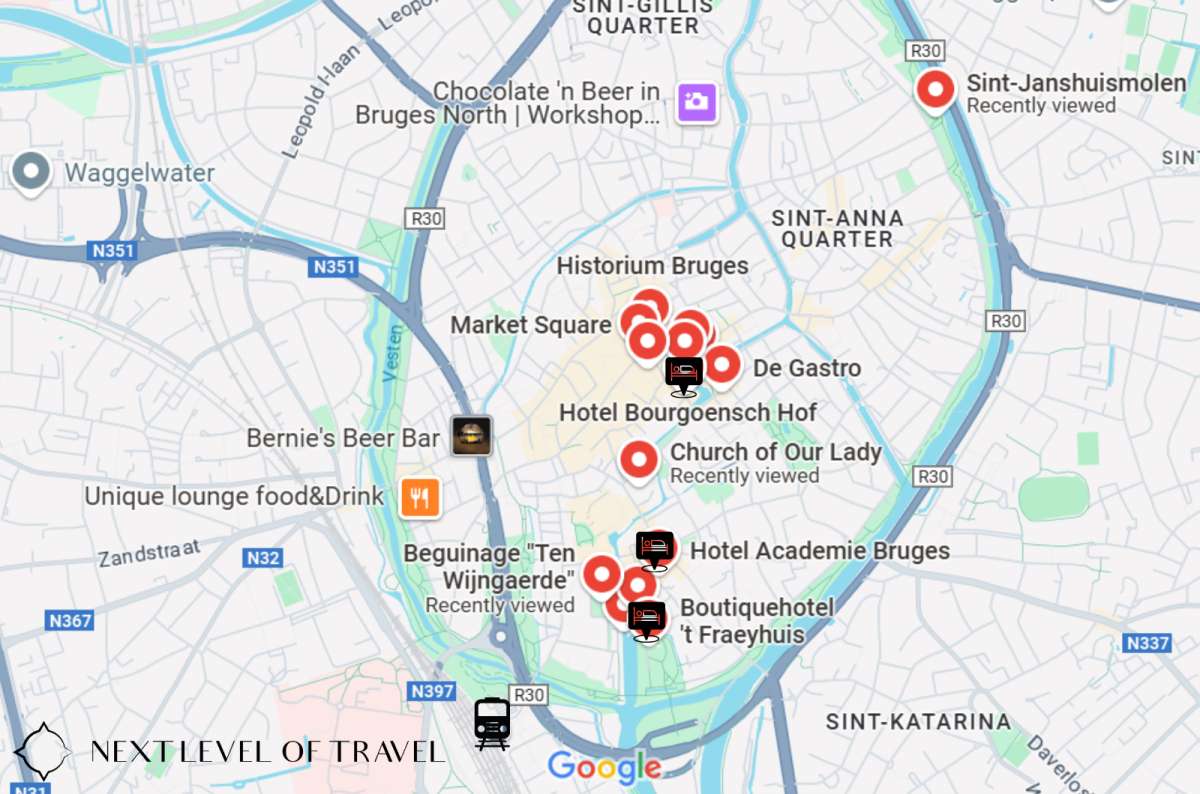
A map of the locations of all the places you’ll see during your day in Bruges (get the full list in Google Maps). Hotels in order of coolness: Boutiquehotel 't Fraeyhuis (best!) | Dukes' Academie Brugge | |Relais Bourgondisch Cruyce
The Brugge train station is right outside the historic city center, which is oval-shaped and completely encircled by the river. Walk, or, if you’re heading to your hotel with luggage, grab a taxi, or hop on bus no. 1 or 2 that leaves from the train station every 5 minutes and takes you to Bruges city center.
Bruges itinerary, stop 2: Stroll across Lovers' Bridge (Minnewaterbrug) and through the lovely Minnewaterpark
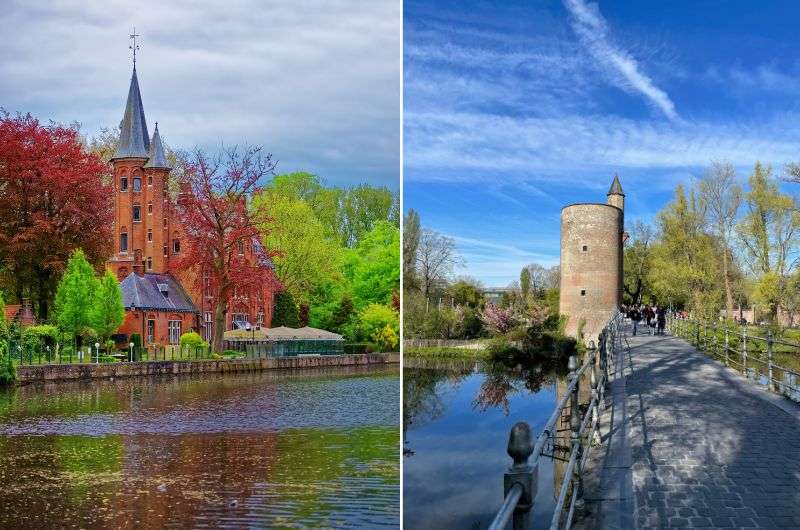
Minnewaterburg and Minnerwaterpark
Visitor information:
- Time spent here: 30 minutes
- Price: 0
- Opening hours: always open
Start your Bruges itinerary just 10 minutes from the train station in the south of the historical center. I made my way up through Bruges from here and it was the perfect trip plan.
Just so you know, this is only the first of two lovers’ bridges you’ll visit during your day in Bruges. This first one isn’t anything very special visually, but it’s supposed to bring you eternal love with whoever you cross it with.
Fun fact: You’ll be crossing the first of many canals of the Reie river system, specifically the stretch known as the Bakkersrei.
After the bridge, stroll through Minnewaterpark, not because it’s anything spectacular, but solely because it’s a scenic way to Brugge city center.
Fun fact: This is the place of Bruges’ trade (namely lace), with the lake being the place where boats would load and unload before heading out to sea.
It’s a lovely park with a lake, and you’ll start getting into the groove of Bruges exploration. Like I said in the introduction, Bruges is really a place where you don’t visit large numbers of tourist attractions, instead wandering and soaking up the atmosphere. So, wander! Beer or coffee in hand is optional, but it certainly cranks up the vacation vibes!
Bruges itinerary, stop 3: Check out Sashuis and the white facades of Beguinage Ten Wijngaerde
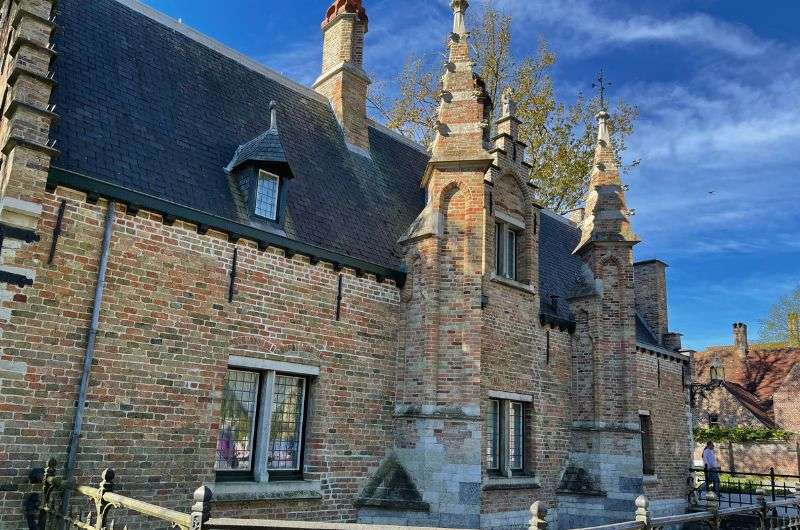
Time for some Bruges architecture—this one is Sashuis house
Visitor information:
- Distance from last stop: 550 m / 0,35 miles, a 7-minute walk
- Time spent here: 30 minutes
- Price: 0
- Opening hours: Daily 7:30 am–8:30 pm for the beguinage, Sashuis Wednesday to Saturday 11:00 am–6:00 pm
I continued north from Minnewaterpark, and crossed back to the other side of the canal through the Sashuis—the houses over the river that used to help regulate the water flow in the city. Nowadays, you can see some shops with local products there. Keep walking (or shop, up to you).
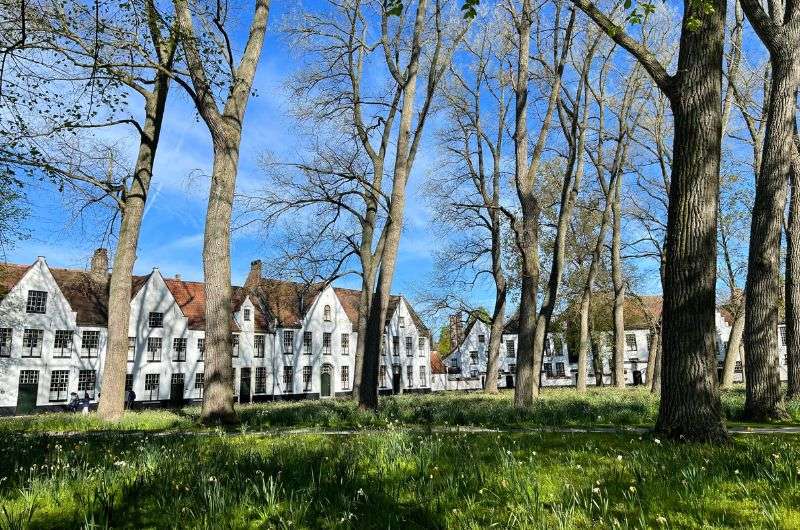
Beguinage Ten Wijngaerde
Next, right across the river, I discovered the beguinage called Ten Wijngaerde. The white facades are in sharp contrast to the red-bricked ones that you’ll find everywhere else in Bruges. It’s a peaceful place, great at the start of your day in Bruges, Belgium, even if for a few minutes. There are a few signs around the grounds to fill you in on the life of the residents here.
A beguinage is like an unofficial convent. The ladies living here weren’t nuns, but lived there all emancipated, but followed religious rules. Today, single women and some real nuns live there, too.
Bruges itinerary, stop 4: A quick visit to the Church of Our Lady Bruges
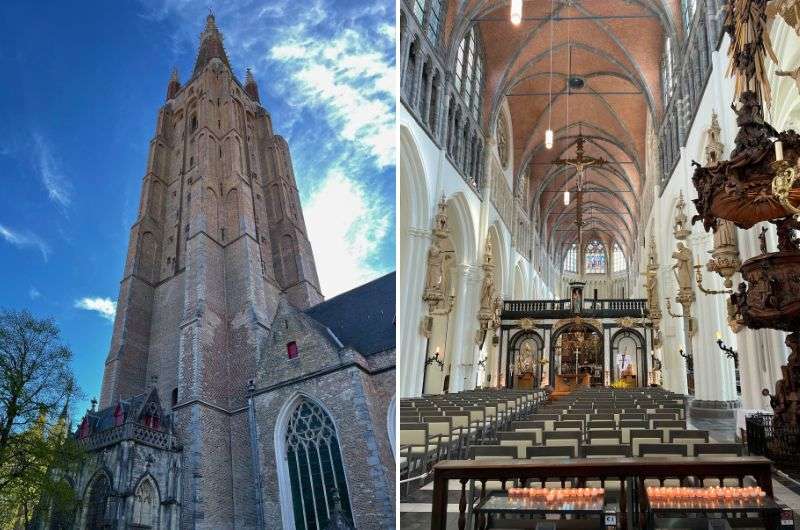
The Church of Our Lady—you won't be able to overlook it!
Visitor information:
- Distance from last stop: 550 m/ 0.34 miles, a 7-minute walk
- Time spent here: 15 minutes
- Price: EUR 8, also available is a combination ticket for the Church of Our Lady and the nearby Gruuthusemuseum for EUR 17 (see next stop)
- Opening hours: Daily 9:30 am–5 pm (opens at 1:30 pm on Sundays)
A day in Bruges wouldn’t be complete without a visit to at least one church. I think they all look the same, but this one literally stands out: the Church of Our Lady of Bruges. The tower is one of the tallest brick buildings in the world.
Unfortunately, the tower isn’t accessible to the public, so you’ll have to make do with the church interiors and a Michelangelo statue. I took a few moments to see his ‘Madonna and child’, which is in the paid section of the church (EUR 8). Just follow the crowds.
The interior of the Church of Our Lady of Bruges is amazing. There are even English signs at some of the art, which is nice.
Time for a Belgian Waffle! My tip on where to get the best one
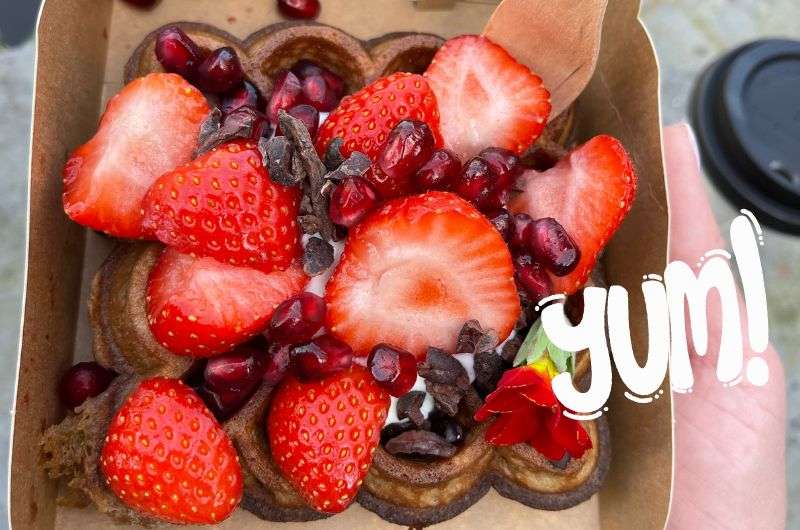
You can't go to Belgium and not taste the waffles they make in all the towns you visit!
Before you head into the church, stop at Otto Waffle Atelier. Waffles are omnipresent in Belgium (read more about Belgian food if that’s surprising to you), which ironically makes it really hard to find a good-quality waffle shop. Otto’s is it. We devoured those things!
Bruges itinerary, stop 5: Choose one of these three museums in Bruges
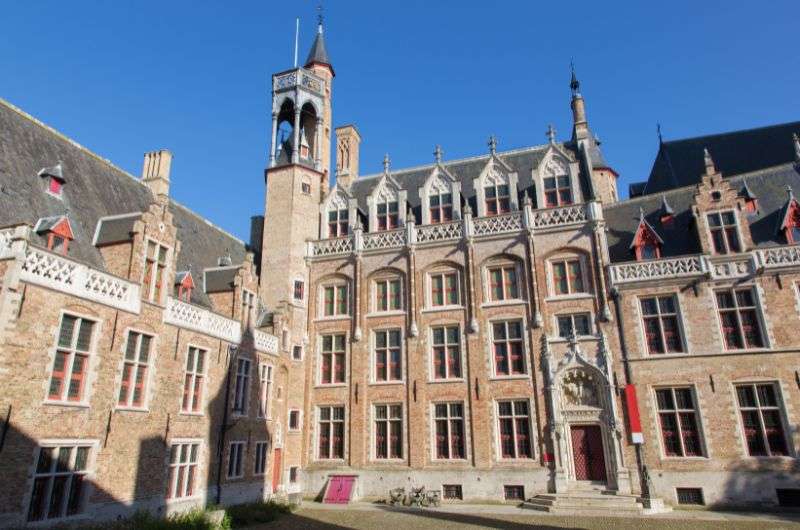
The Gruuthusemuseum
Visitor information:
- Distance from last stop: 230 m/ 0.14miles a 3-minute walk
- Time spent here: 45 minutes to an hour per museum
- Price: EUR 15 each, also available is a combination ticket for the Church of Our Lady and Gruuthusemuseum for EUR 17 (see previous stop)
- Opening hours: Daily 9:30 am–5:30 pm
These three spots are right next to the Church of Our Lady of Bruges, so you can just walk out of the church and then straight into one of the museums. For this Bruges itinerary, choose one. If you have more time in Bruges, choose more.
Here are your options in the order in which I personally prefer them:
-
Gruuthuse is the restored palace of the lords of Bruges. The Gruuthusemuseum tells visitors the story of 500 years of the city’s history through objects from tapestries to lace and porcelain, but even just looking at the interior architecture is worthwhile.
-
Sint-Janshospitaal (St. John’s Hospital) is one of the oldest preserved hospitals in Europe, and again, the structure alone is something special. There’s a smallish pharmacy that’s set up like it would have been back in the day, which is very cool, and it also displays lots and lots of religious art. Later on the boat canal tour, we passed by the back “cholera door“ of this hospital. It’s the last exit some of the patients took out of here… if you know what I mean (it always led straight into the waters of the canal…).
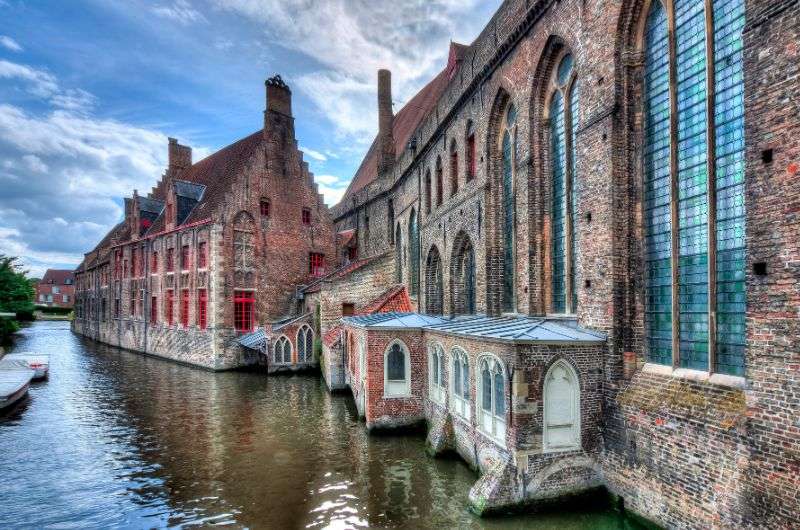
Sint-Janshospitaal
- The Groeninge Museum takes you through six centuries of Belgian art. You start with the Flemish primitives—I thought the details on these were mesmerizing!—and end with Belgian modern art.
Quick stop 6: Bonifacius Bridge aka the Love at First Sight Bridge
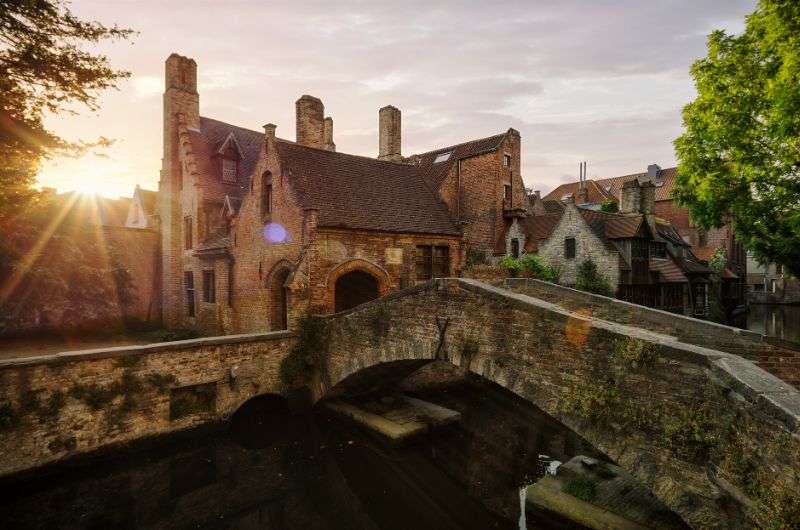
This is where the magic happens
Visitor information:
- Distance from last stop: 100 m / 0.06miles a 2-minute walk
- Time spent here: 2 minutes
- Price: 0
- Opening hours: all the time
I’m not exactly a hopeless romantic, but I won’t say NO to love. I’m not that cynical. The Bonifacius Bridge, once called (and confused with the other) Lovers’ Bridge, promises to turn anyone you set your eyes on once you cross it into your true love.
Despite being one of the youngest bridges in the city, it is very picturesque and historically looking.
Here’s my love tip: If you’re spending one day in Bruges on your own, go grab a new love at Bonifacius Bridge and then, if you’re happy with the bridge’s choice, drag them over the Lovers’ Bridge in the south to seal the deal.
What’s that? A growl in your stomach? No worries, I’ve found the perfect place to eat in Bruges:
Lunch in Bruges at a family-run restaurant
De Gastro is a small, modern, family-run restaurant that has the nicest servers ever. Everyone around us was eating mussels, which I hate, but I guess they do them well. I opted for some beef and croquettes, and they were delicious! You can choose to sit inside, in the courtyard, or at the few tables lining the street.
Bruges itinerary, stop 7: Hop on a cute boat for a Bruges canal tour
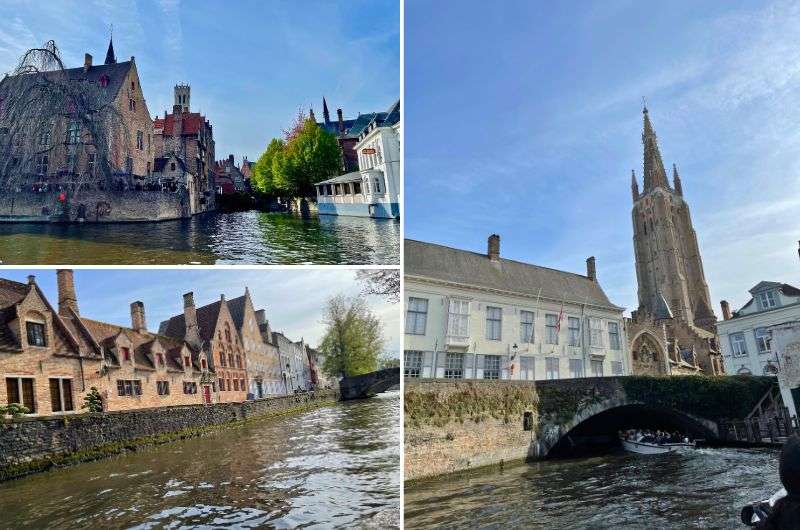
A pleasant cruise on the Bruges Canal will show you many beautiful corners of the city
Visitor information:
- Distance from the last stop: 100 m
- Time spent here: 35 minutes
- Price: EUR 15
- Opening hours: Daily 10 am–6 pm
Belgian food is not exactly known to be light, so I urge you to put this unmissable Bruges experience right after lunch so you can digest while you sightsee! On a boat tour, that is.
Just like in Ghent, you board a little boat and go up and down the canals so you can see the historical buildings lining the water. It’s a pleasant way to spend 30 minutes, even if it’s nothing spectacular. The guides add fun facts and jokes the whole way—look out for that hospital back door!
A small rant: I have to say the seating isn’t that great, because you’re crammed inside with 30–40 others, facing to one side the whole way.
There are several boat companies in Bruges that all provide the same service and the same route, so just hop on any one you happen to like departure time of. They leave from a few spots between De Dijver Park and just behind the Relais Bourgondisch Cruyce hotel.

Bruges itinerary, stop 8: Climb up the Bruges Belfry tower and visit the Market Square
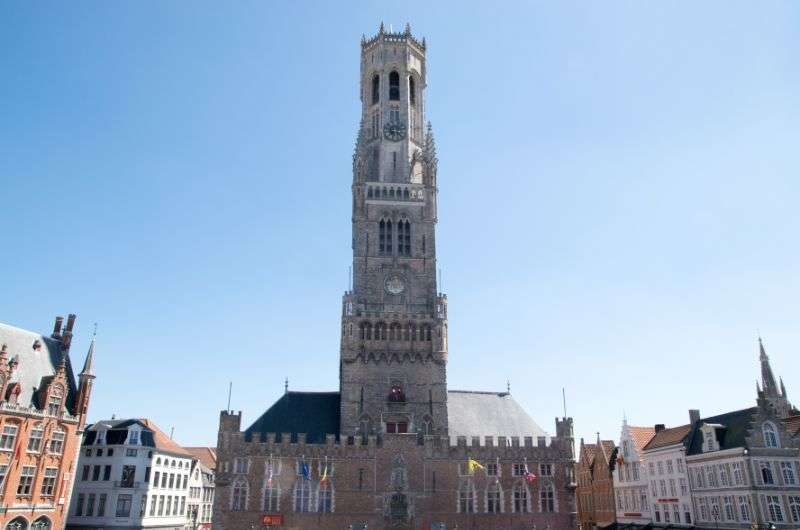
The symbol of Bruges—Belfry
Visitor information:
- Distance from last stop: 200 m / 0.12 miles a 3-minute walk
- Time spent here: 30 minutes
- Price: EUR 15, make sure to buy tickets in advance! The Musea Brugge Card gets you in for “free”
- Opening hours: Daily 9 am–8 pm (varies in the winter months)
Ok, its finally time to visit one of the top attractions you’ll see on this Bruges itinerary: the Belfry tower with epic views over Bruges (and a history lesson).
The Belfry is the symbol of Bruges’ power in the 13th century. The bell tower stands tall at 83 m (272 ft) above the Grote Markt. You’ll be able to visit the treasury and the carillon room on the way up the 366 steps of the narrow, winding stairway, as well as marvel at the impressive wooden structure on the inside of the tower. The carilloneur plays the 47 bells on Wednesdays, Saturdays, and Sundays from 11 am–12 pm.
Once at the top, take in the views of Bruges and beyond.
Pro tip: Buy your tickets in advance, because they have a strict limit on the number of people that are allowed in, and I, sadly, wasn’t one of them.
How to buy tickets for the Bruges Belfry
You can wait in line to see if you’re lucky, but getting your ticket in advance is the smarter way to go, as proved by my own experience in Bruges, where I couldn’t get in. A ticket gets you a time slot during which you are guaranteed to be let in—don’t be late, they are strict
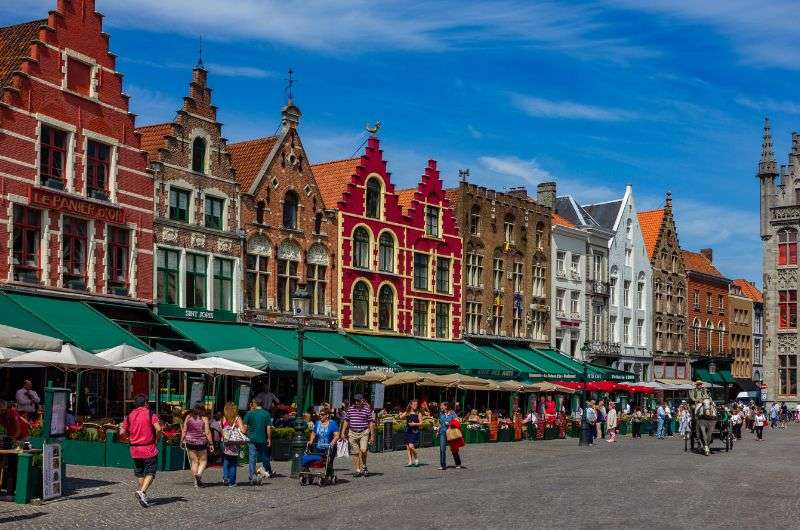
Time to eat and buy souvenirs at the Grot Markt!
Take a stroll around Market Square
Back on the ground, continue your Brugge itinerary with a little wander around Market Square (Grote Markt), one of Bruges' main squares. It’s lined with many colorful facades and flooded by tourists and locals on most days. If you’re visiting Bruges in December, it’s where you’ll find the annual Christmas market.

Bruges itinerary, stop 9: Tour the incredible Bruges Town Hall on De Burg Square
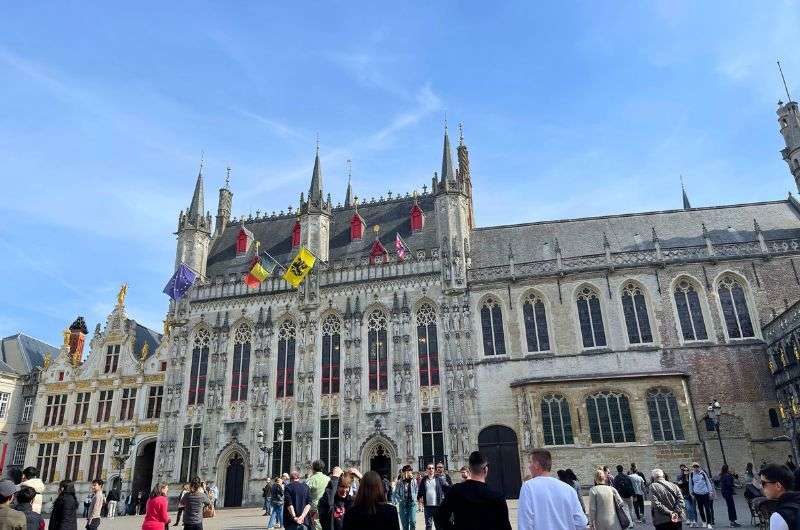
Of course, we have to see the City Hall of Bruges!
Visitor information:
- Distance from last stop: 270 m / 0-17 miles a 3-minute walk
- Time spent here: 30–45 minutes
- Price: EUR 8
- Opening hours: Daily 9:30 am–5 pm (council meetings are the last Monday of each month)
After NOT getting into the Belfry, I walked just a couple of minutes to the slightly smaller De Burg Square. There are two buildings worth noticing here: Bruges Town Hall and the Basilica of the Holy Blood (see next stop).
All I can say to the Town Hall is wow! The Bruges City Hall is one of the oldest city halls in the Benelux countries, inspiring cities such as Brussels and Ghent when they built their city halls.
Gothic architecture has a way to make your jaw drop. Usually, it’s enough to admire city halls from the outside, but in Bruges, you need to make an exception. I got the audio guide, and it was worth it for the interesting information.
I truly enjoyed the life-size portraits of kings, mayors, and even Napoleon. There are also modern additions, such as augmented reality and models of the city, but the most incredible part of Bruges’ city hall is the historical Gothic Hall on the first floor. Make sure to look up at the wooden ceiling!
Fun fact: The city council still meets here every month, as do many, many lovers who get married in it.
Bruges itinerary, stop 10: See Jesus’ blood at the Basilica of the Holy Blood
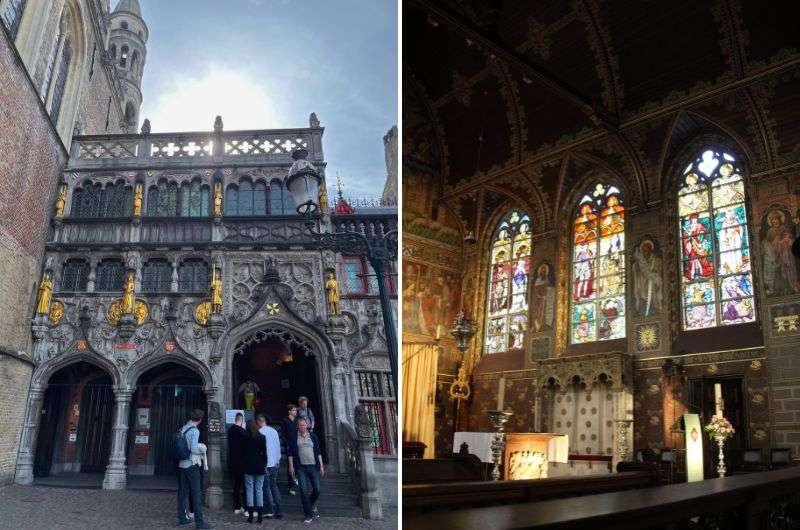
Basilica of the Holy Blood, another gem of Bruges
Visitor information:
- Distance from last stop: 0
- Time spent here: 10 minutes if you skip the blood, more like 30 minutes if you want to stand in line to see the relic
- Price: EUR 5 museum, donations encouraged
- Opening hours: Daily 2 pm–4 pm and Fridays 10:15 am–11 am if you want to see the vial with the blood-stained cloth; the basilica is open daily 10 am–5:15 pm
My next stop on this day trip in Bruges itinerary, once I was done at the Bruges Town Hall, was a unique church right next door to it—the Basilica of the Holy Blood.
I found it fascinating that it’s smashed between the other buildings on the square like a townhouse. How often do you see that??
The interior is actually really cool, very ornate, but not in a gold-threw-up-all-over-the-place way, but in a large-fresco-in-a-small-church-with-amazing-vaulted-ceiling kind of way.
See the relic that is said to be Jesus’ blood
I’ve shared my opinion of holy relics when I wrote about the Turin Shroud, but let’s just say I’m not buying into the Jesus frenzy. The upper chapel of the basilica holds a piece of cloth stained with Jesus’ blood (or so they say). If you want to see it, time your visit between 2 pm–4 pm. On Fridays, there’s another veneration between 10:15 am and 11 am.
You’ll have to line up, shut up, and not take photos. Or so the sign said, and the attendants looked like they meant business, so be respectful. Once it’s your turn, you go up to the priest and are shown THE BLOOD. No photos allowed.

Bruges itinerary, stop 11: You have to try the Bruges Beer Experience (or alternative brewery tour)
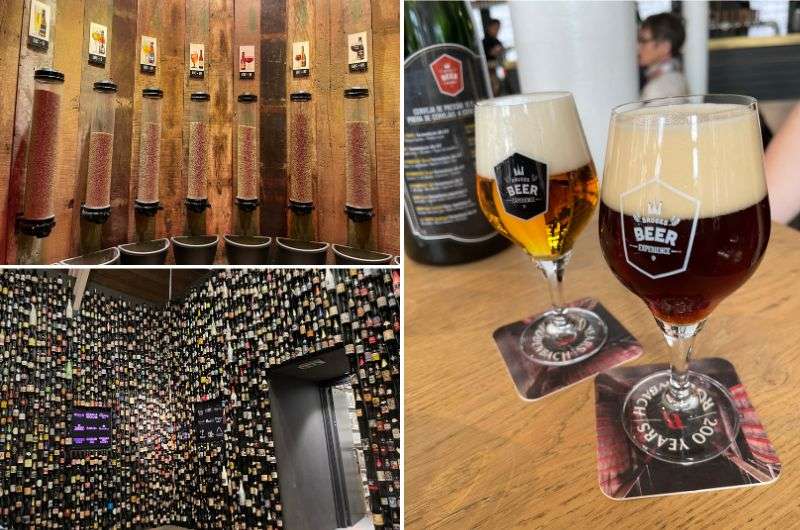
And finally, the Bruges Beer experience!
Visitor information:
- Distance from last stop: 100 m / 0.06 miles a 1-minute walk
- Time spent here: 2 hours
- Price: EUR 14, or EUR 20 with beer tasting at the end
- Opening hours: Daily 10 pm–6 pm (last entry at 5 pm), bar and shop close at 6:30 pm
This next item on the itinerary for Bruges was my favorite experience in Bruges, and also my favorite museum in Belgium, so even if you aren’t a beer enthusiast, pay attention.
I visited two beer tours in Bruges, and they were both great—I’ll tell you a little about the De Halve Maan Brewery below so you can choose to go there instead if you want.
My experience with the Bruges Beer Experience
The Bruges Beer Experience is an interactive and highly informative museum where you learn about beer history, techniques, ingredients, and individual beer styles.
Every visitor 4 years and older (they do a kid’s tour, too!) got their own tablet and headphones, and we walked around at our own pace.
I personally was blown away learning about what beer is supposed to taste like when you’re not just focused on lagers all the time. The beer culture in Belgium is what wine is in other countries—a high-end beverage that gets paired with chocolates, cheeses, and Michelin restaurant dishes! Now that’s my type of dining!
At the end of the tour, you can get a tasting of 3 (strong!) beers in the bar, which gets bonus points for having a nice view over Market Square. It is accessible to the public, and you don’t need to be on the tour in order to visit it. It can also be used as a regular bar.
Alternative: Brewery tour at De Halve Maan Brewery
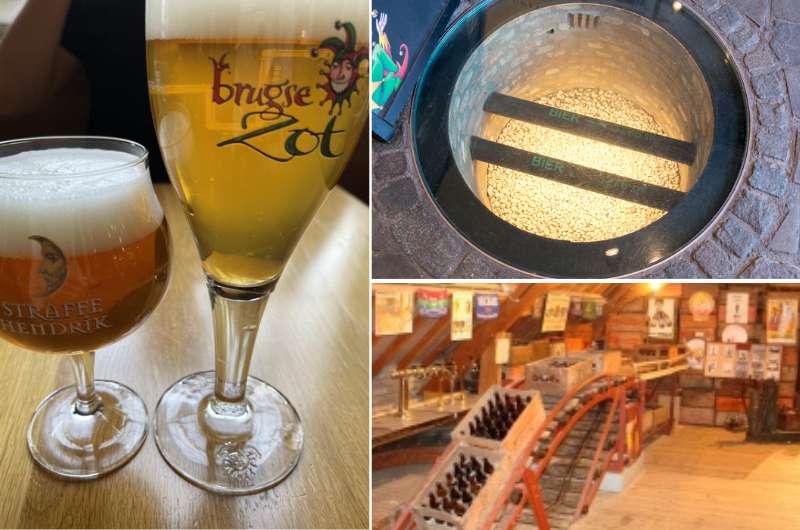
I recommend the “The half moon” brewery
Visitor information:
- Price: EUR 16 for the 45-minute tour
- Opening times: Tours in English run 4x a day between 12 pm and 4:30 pm (time the last tour starts)
- Official website: De Halve Maan
As an alternative option for your day in Bruges (or if you have more time in Bruges), you could do this cool brewery tour.
Pro tip: I did both the Beer Experience and the De Halve Maan Brewery tour in a single day, so if that sounds awesome to you, I assure you it’s possible
Here’s what the De Halve Maan is all about:
In the southern part of town, halfway between Lovers’ Bridge and the Church of Our Lady Bruges, is the only brewery that has managed to stay in central Bruges—De Halve Maan (“The half moon”).
As such, it is in a historical building with historical building smells, narrow winding staircases, and old production secrets waiting to be told. You can take a 45-minute tour through the brewery to learn some of them, or the XL tour that lasts 90 minutes (I did the shorter one).
It was pretty cool to learn about and see the beginning of a one-of-a-kind, 3.2 km (2 miles) beer pipeline connecting the brewery and their bottling plant. It’s at the entrance to the brewery.
Beer tip: The unfiltered Brugse Zot can only be bought at De Halve Maan brewery. It was fabulous!
The tour I took ended on the brewery roof where we get not only a free beer, but a fantastic view of Bruges.
Bruges itinerary, optional stop 12: Admire Bruges’ windmills… and then off to dinner
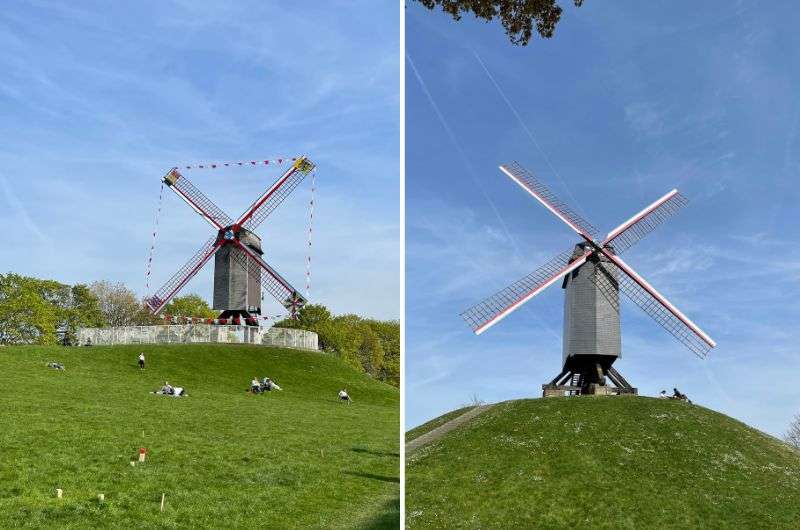
Sint Janshuis Mill on the left and Nieuwe Papegaai Mill on the right
Visitor information:
- Distance from last stop: 1.5 km / 0.93 miles a 20-minute walk
- Time spent here: As long as you care to walk around for
- Price: EUR 5 for Sint-Janshuis Mill
- Opening hours: Sint-Janshuis Mill is the only one you can enter, daily except Mondays from 9:30 am –12:30 pm and 1:30 pm–5 pm
It’s been a long day in Bruges, but this was the perfect end to my Bruges itinerary, so I’m passing on the tip: Take a chill walk out to the city’s four leftover wooden windmills on the eastern edge of the city. It’s a slightly windy 1 km (0.6 mile) stretch along the old city ramparts located between the Dampoort and the Kruispoort (city gates)—no tour groups, no waffle stands.
There were originally 23 windmills in Bruges, but today, only Sint Janshuis Mill still grinds grain! You can go look inside this particular windmill if you get there before 5 pm (not sure if you can make it on this trip plan, to be honest, but you aren’t missing much if you don’t). Also look for the parrot on the roof of the Nieuwe Papegaai Mill.
Once you’re done, you may be heading back to your hotel if you came on a day trip to Bruges from Brussels, or you’ll want to head straight for dinner. Here’s a tip I got from a Bruges local:
Dinner in Bruges: Where I ate the best steak in Belgium
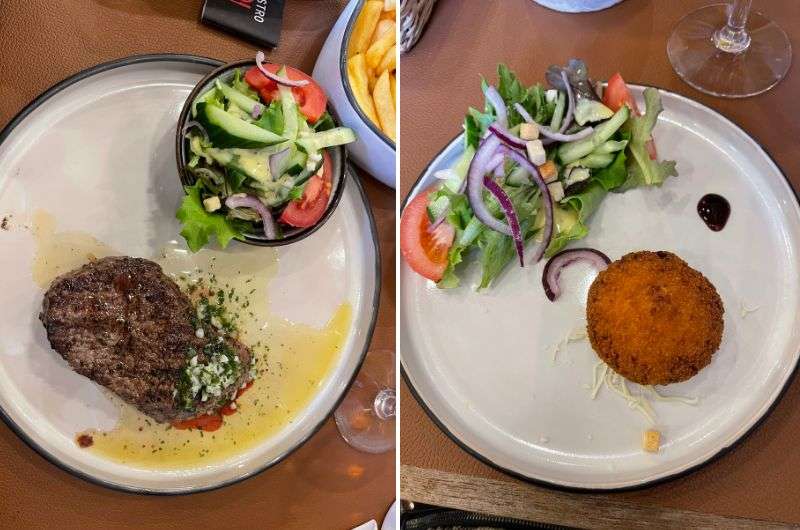
And now, a tasty dinner at Bistro Christophe!
You have to go to Bistro Christophe for dinner to end your day in Bruges. Heck, stay the night just to be able to taste the food here!
They’re only open in the evenings on most days, so make sure to get a reservation. There’s a fantastic degustation menu, and I had the best steak in Belgium here. I wasn’t mad at the créme brulée either.
And that’s it, folks! Your 1-day Bruges itinerary has come to an end.
How to get to Bruges (and where to park your car in Bruges)
By train: The easiest way to get into Bruges. It’s just 1 hour from Brussels and 30 minutes from Ghent. The train station sits just outside the southern end of the city center, right across the canal near Lovers’ Bridge.
By car: Parking in Bruges is a pain—expensive, limited to 4 hours at EUR 2/hour, and not worth the hassle. Don’t arrive by car unless you absolutely have to.
Here are your best options:
-
Station Parking (Centrum‑Station Interparking):
– Cheapest garage: €6/day
– Located at the train station
– Includes free bus transfer to the city center (up to 4 people) -
Park & Ride lots (P&R):
– Free all day
– Located outside the center (e.g., Waggelwater, Jan Breydel, Steenbrugge)
– Access the city via bus or a 10–20 min walk -
Blue Zone street parking:
– Free for up to 4 hours with a parking disc
– Valid daily from 9 am to 6 pm
– Check signage carefully—zones are strictly enforced -
Avoid Centrum-’t Zand Parking:
– It’s now €16.80/day, making it one of the most expensive options unless you’re staying nearby or arriving late in the evening -
Hotel parking tip:
If you are coming by car and staying the night, make sure to book a hotel in the Bruges city center with free parking and skip all the parking drama.
For more on trains, public transport, and Belgium travel hacks, check out my Belgium travel tips guide.
Where to next?
Here’s where you could head next after you complete your day in Bruges:
- Ghent—Less polished than Bruges, more alive, my personal favorite.
- Antwerp—Cool city vibes.
- Brussels—The capital of Belgium, a totally underhyped travel destination in Europe.
- Or, check out more day trips from Brussels—Charleroi, or maybe even Paris?!
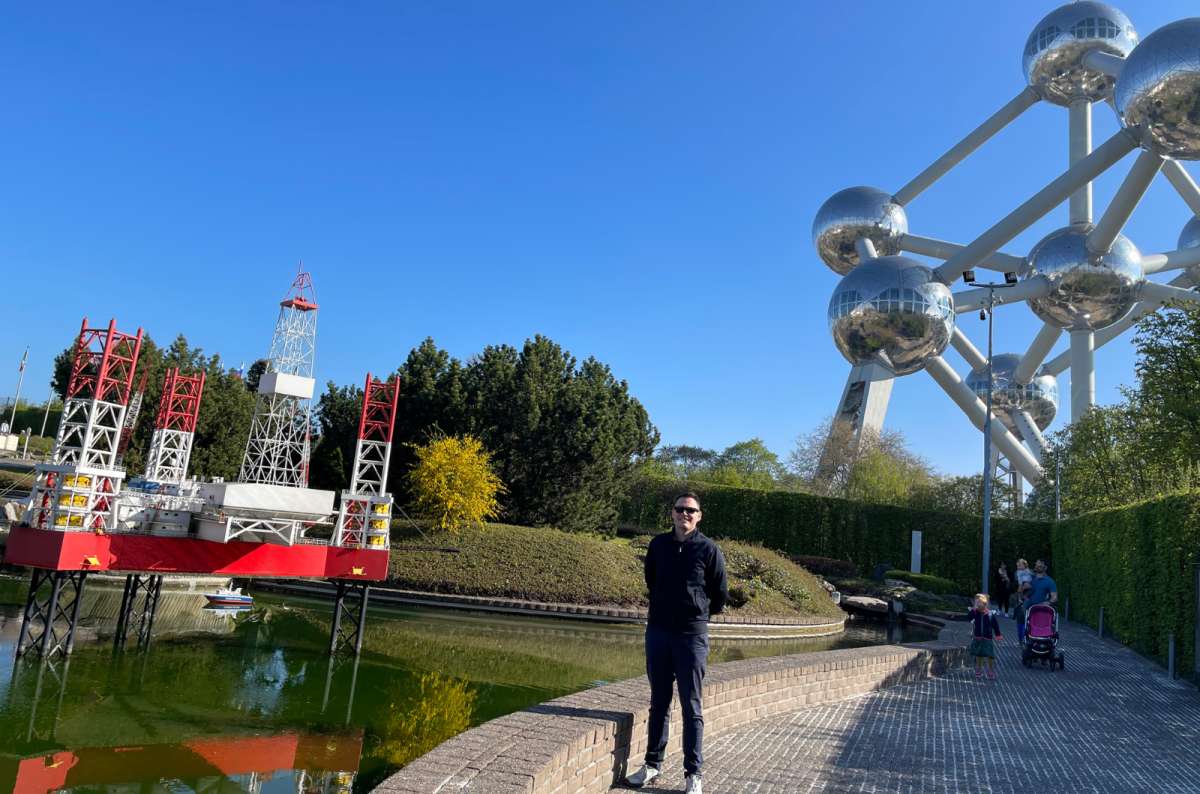
Don’t forget to visit Mini-Europe when you’re in Brussels—where you can see the whole continent in an afternoon (plus get a great view of the Atomium)!
Why is Bruges so famous?
Because old, brick buildings lining a web of canals with lots of bridges make Bruges incredibly picturesque. Also, the beer, beer museums, and beer culture is something you don’t want to miss—even if you’re not a beer drinker yourself. Though, it helps.
Which is better, Ghent or Bruges?
I like Ghent better because it feels like a real Belgian city as opposed to a tourist town. Both are nice, just the vibes are very different, and Bruges gets a little overwhelming after a day.
What is the most popular beer in Bruges?
The most famous brewery is De Halve Maan, and their Brugse Zot is the beer to try. The unfiltered version of it is only available at the bar at the brewery. Otherwise, Belgium has a huge beer culture, and Bruges has at least two museums/tours that you should definitely visit so you learn more about it (The Bruges Beer Experience and De Halve Maan are my top picks). The Bruges beer scene is much more sophisticated than I expected!
Is Brugge a walkable city?
Yes—Bruges is 100% walkable, and honestly, it’s the only way to do it right. The historic center is compact and mostly car-free, with everything you’ll want to see—Markt square, Belfry, canals, chocolate shops, packed into a small area that’s easy to cover on foot in a day. From the train station, you start by walking the scenic route through Minnewater Park, and that sets the tone for the perfect day in Bruges Belgium
You might also be interested in reading:
Sometimes, all you need to do is take the first step... I've filtered out the best hotels in Bruges for you
Save it for yourself to come back to later, or share with your friends on social media!
This post contains affiliate links. If you make a booking through one of my links, I may earn a small commission—at no additional cost to you. Thank you for your support!
Quick summary: Your 1-day Bruges itinerary at a glance
My trip notes for this Bruges itinerary: Where to eat, sleep, and travel tips
Bruges itinerary, stop 1: Arriving at Bruges train station
Bruges itinerary, stop 3: Check out Sashuis and the white facades of Beguinage Ten Wijngaerde
Bruges itinerary, stop 4: A quick visit to the Church of Our Lady Bruges
Time for a Belgian Waffle! My tip on where to get the best one
Bruges itinerary, stop 5: Choose one of these three museums in Bruges
Quick stop 6: Bonifacius Bridge aka the Love at First Sight Bridge
Lunch in Bruges at a family-run restaurant
Bruges itinerary, stop 7: Hop on a cute boat for a Bruges canal tour
Bruges itinerary, stop 8: Climb up the Bruges Belfry tower and visit the Market Square
Bruges itinerary, stop 9: Tour the incredible Bruges Town Hall on De Burg Square
Bruges itinerary, stop 10: See Jesus’ blood at the Basilica of the Holy Blood
Bruges itinerary, stop 11: You have to try the Bruges Beer Experience (or alternative brewery tour)
Alternative: Brewery tour at De Halve Maan Brewery
Bruges itinerary, optional stop 12: Admire Bruges’ windmills… and then off to dinner
Dinner in Bruges: Where I ate the best steak in Belgium
How to get to Bruges (and where to park your car in Bruges)
Which is better, Ghent or Bruges?


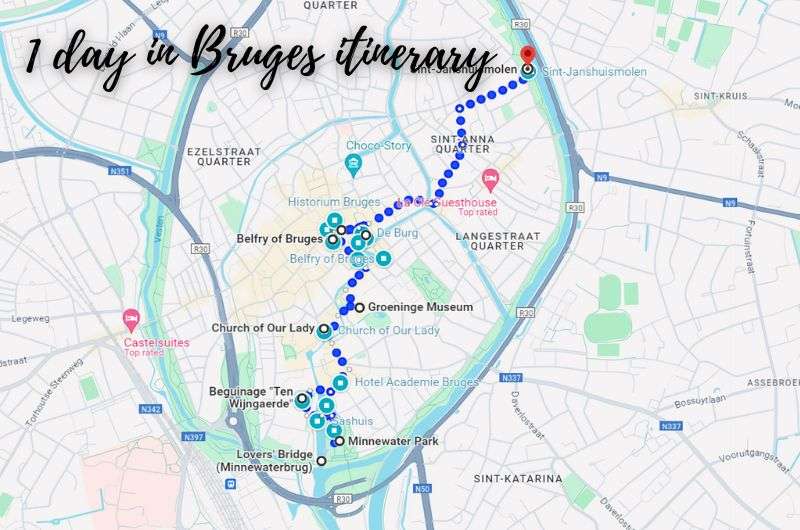


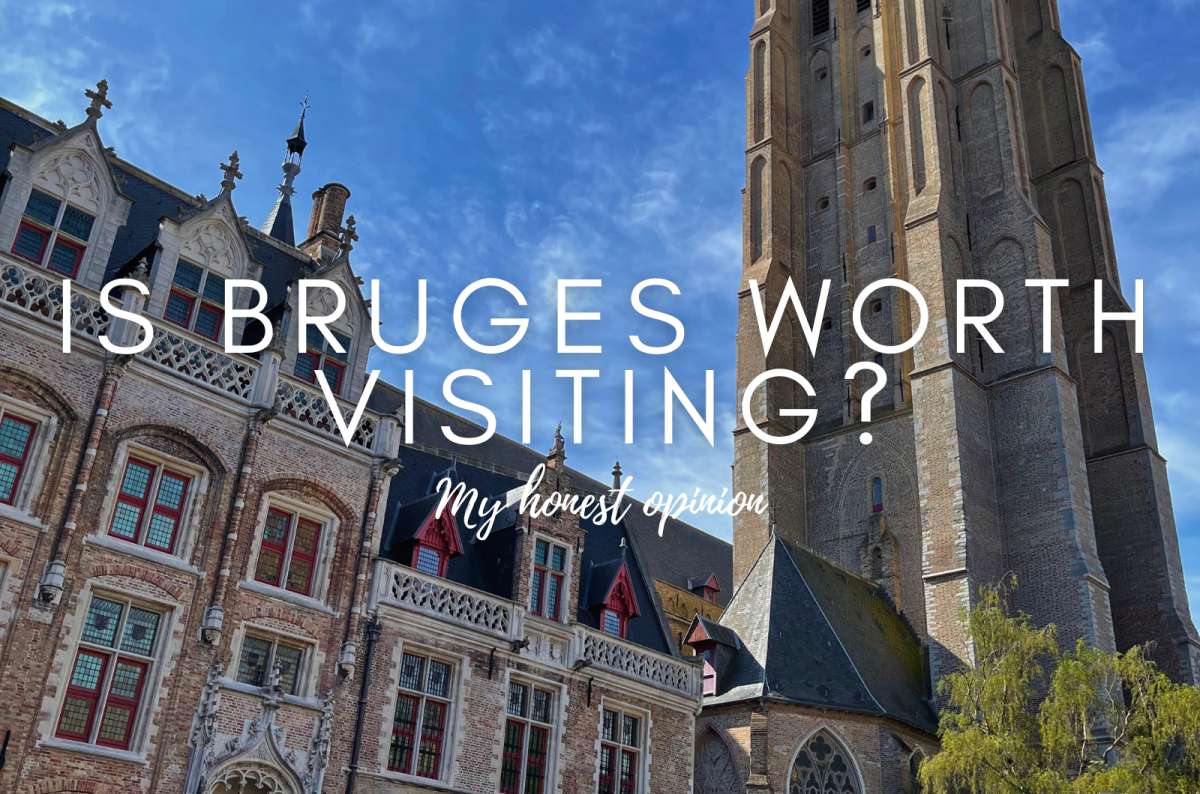
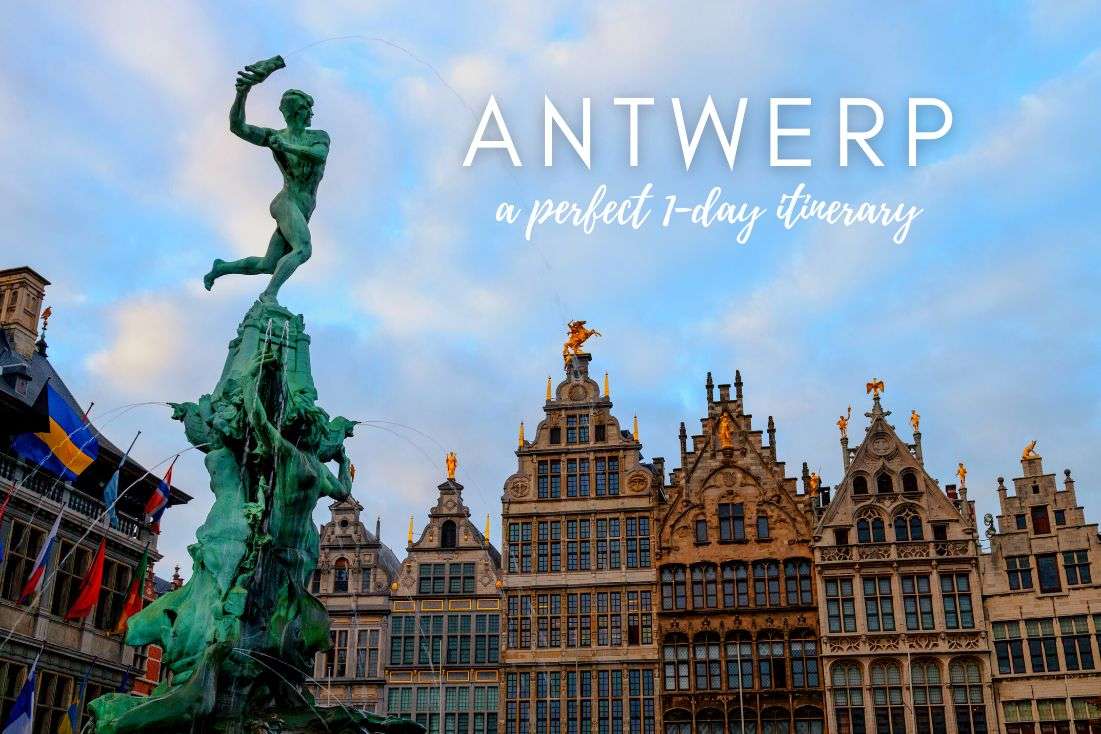
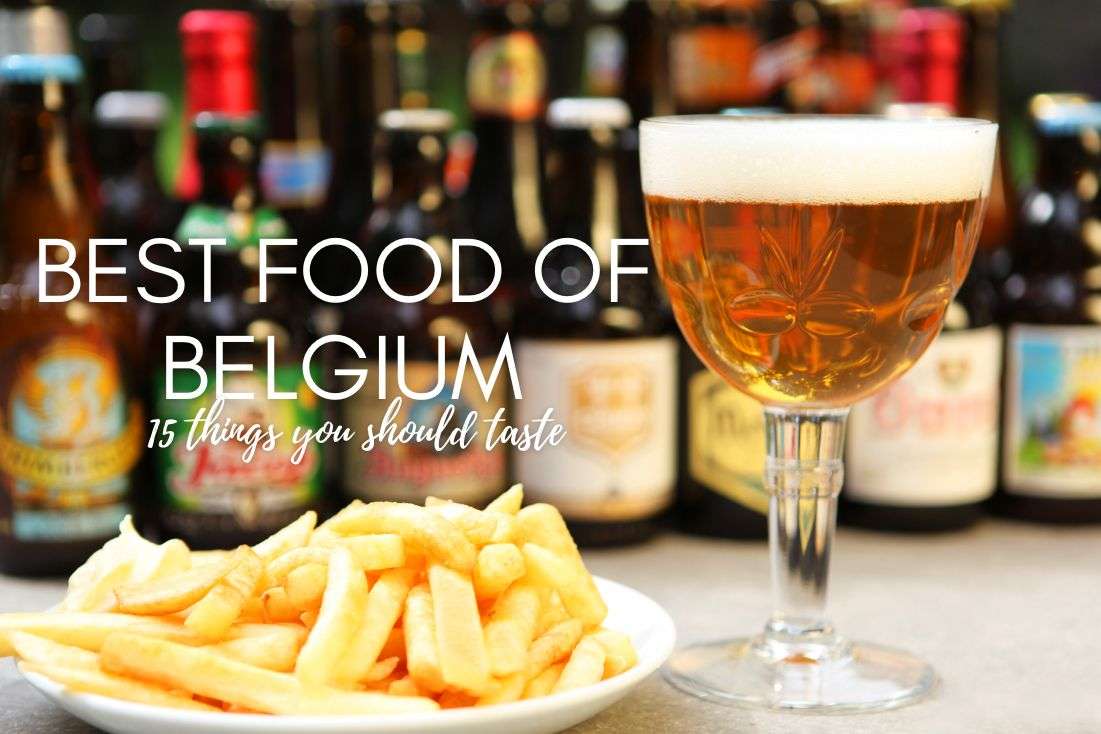



Comments | Thoughts? Give us a shout!